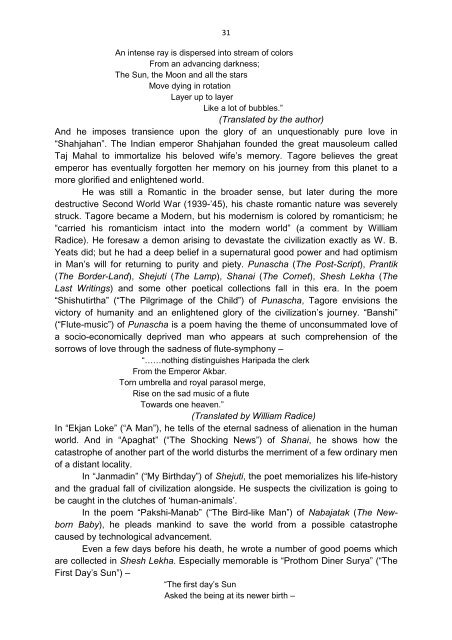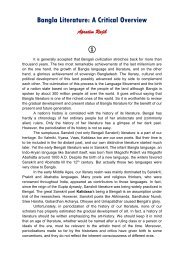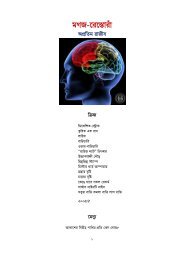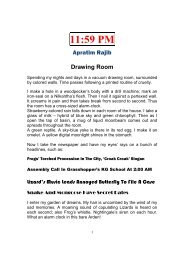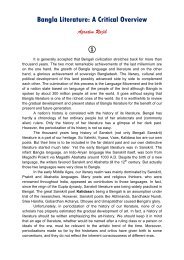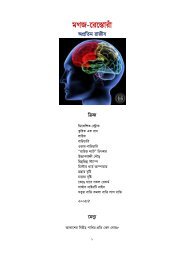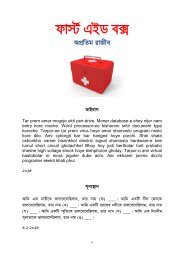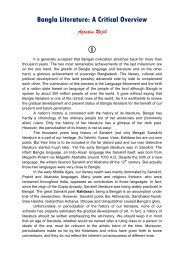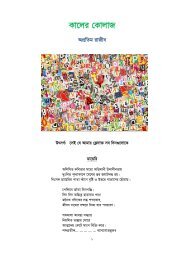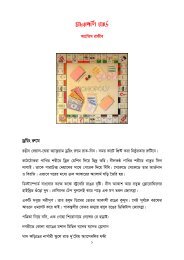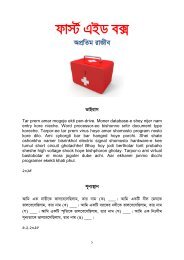BLiterature-Apratim
Create successful ePaper yourself
Turn your PDF publications into a flip-book with our unique Google optimized e-Paper software.
31<br />
An intense ray is dispersed into stream of colors<br />
From an advancing darkness;<br />
The Sun, the Moon and all the stars<br />
Move dying in rotation<br />
Layer up to layer<br />
Like a lot of bubbles.”<br />
(Translated by the author)<br />
And he imposes transience upon the glory of an unquestionably pure love in<br />
“Shahjahan”. The Indian emperor Shahjahan founded the great mausoleum called<br />
Taj Mahal to immortalize his beloved wife’s memory. Tagore believes the great<br />
emperor has eventually forgotten her memory on his journey from this planet to a<br />
more glorified and enlightened world.<br />
He was still a Romantic in the broader sense, but later during the more<br />
destructive Second World War (1939-’45), his chaste romantic nature was severely<br />
struck. Tagore became a Modern, but his modernism is colored by romanticism; he<br />
“carried his romanticism intact into the modern world” (a comment by William<br />
Radice). He foresaw a demon arising to devastate the civilization exactly as W. B.<br />
Yeats did; but he had a deep belief in a supernatural good power and had optimism<br />
in Man’s will for returning to purity and piety. Punascha (The Post-Script), Prantik<br />
(The Border-Land), Shejuti (The Lamp), Shanai (The Cornet), Shesh Lekha (The<br />
Last Writings) and some other poetical collections fall in this era. In the poem<br />
“Shishutirtha” (“The Pilgrimage of the Child”) of Punascha, Tagore envisions the<br />
victory of humanity and an enlightened glory of the civilization’s journey. “Banshi”<br />
(“Flute-music”) of Punascha is a poem having the theme of unconsummated love of<br />
a socio-economically deprived man who appears at such comprehension of the<br />
sorrows of love through the sadness of flute-symphony –<br />
“……nothing distinguishes Haripada the clerk<br />
From the Emperor Akbar.<br />
Torn umbrella and royal parasol merge,<br />
Rise on the sad music of a flute<br />
Towards one heaven.”<br />
(Translated by William Radice)<br />
In “Ekjan Loke” (“A Man”), he tells of the eternal sadness of alienation in the human<br />
world. And in “Apaghat” (“The Shocking News”) of Shanai, he shows how the<br />
catastrophe of another part of the world disturbs the merriment of a few ordinary men<br />
of a distant locality.<br />
In “Janmadin” (“My Birthday”) of Shejuti, the poet memorializes his life-history<br />
and the gradual fall of civilization alongside. He suspects the civilization is going to<br />
be caught in the clutches of ‘human-animals’.<br />
In the poem “Pakshi-Manab” (“The Bird-like Man”) of Nabajatak (The Newborn<br />
Baby), he pleads mankind to save the world from a possible catastrophe<br />
caused by technological advancement.<br />
Even a few days before his death, he wrote a number of good poems which<br />
are collected in Shesh Lekha. Especially memorable is “Prothom Diner Surya” (“The<br />
First Day’s Sun”) –<br />
“The first day’s Sun<br />
Asked the being at its newer birth –


